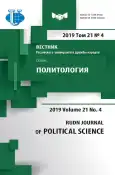Leo Strauss and His Neoconservative Disciples (on the Problem of the Sources and Genesis of Neoconservatism)
- Authors: Blokhin K.V.1
-
Affiliations:
- Center of Security Problems of Russian Academy of Science
- Issue: Vol 21, No 4 (2019)
- Pages: 729-744
- Section: RIGHT-WING POPULISM IN THE USA AND EUROPE: ORIGINS AND MODERNITY
- URL: https://journal-vniispk.ru/2313-1438/article/view/339737
- DOI: https://doi.org/10.22363/2313-1438-2019-21-4-729-744
- ID: 339737
Cite item
Full Text
Abstract
The article discusses the problem of Leo Strauss’ influence on the political culture of the United States and analyzes the current historiographic situation pertaining to the problem. The authors demonstrate that both in the USA and in modern Russia the question of the degree and nature of L. Strauss’s influence on the neocons remains open. Meanwhile, it is obvious that Strauss had a significant impact on the formation of neoconservative ideology, which is manifested in the similarity of the basic ideas of the philosopher and his disciples. The formation of the philosopher’s views took place during the crisis of the Weimar Republic and the Nazis’ rise to power in Germany, which postulated Strauss’ idea about the need for strong democracy and its ability to defend itself against tyranny. The concept of strong democracy that can withstand totalitarianism and authoritarianism is one of the key ideas of neo-conservatism. The similarity of Strauss’ philosophical views to those of the neoconservatives is seen in criticism of the liberal world order and moral foundations of the West, which gave rise to relativism and nihilism. The conformity of neoconservative worldview, including and its variants, such as straussianism, to the ideas of Strauss is manifested in advocating the interests of Israel, which the founders of neo-conservatism view as an outpost of the Western world.
About the authors
Konstantin V. Blokhin
Center of Security Problems of Russian Academy of Science
Author for correspondence.
Email: Constantinos1@rambler.ru
PhD in History, Leading Research Fellow of The Center of Security Problems of Russian Academy of Science
Garibaldi str., 21 B, Moscow, Russian Federation, 117335References
- Thompson C.B. Neoconservatism: An Obituary for an Idea. Boulder, CO: Paradigm Publishers; 2010. 303 p.
- Gottfried P.E. Leo Strauss and the Conservative Movement in America: A Critical Appraisal. Cambridge; New York: Cambridge University Press; 2012. 182 p.
- Heilbrunn J. They Knew They Were Right. The Rise of the Neocon. New York: Doubleday; 2008. 320 p.
- Velasco J. Neoconservatives in U.S. Foreign Policy under Ronald Reagan and George W. Bush. Voices Behind the Throne. Washington, D.C.: Woodrow Wilson Center Press; Baltimore: Johns Hopkins University Press; 2010. 300 p.
- Norton A. Leo Strauss and the Politics of American Empire. New Haven: Yale University Press; 2004. 235 p.
- Freidman M. Neoconservative Revolution: Jewish Intellectuals and the Shaping of Public Policy. Cambridge: Cambridge University Press; 2005. 303 p.
- Pavlov A.V. The Pragmatic Heirs of Leo Strauss. Istoriya filosofii. 2008; 13: 98-109 (In Russ.).
- Mishurin A.N. Knowledge and Power in the Political Philosophy of Leo Strauss. PhD thesis in political sciences. Moscow: Russian Academy of Sciences; 2014. 151 p. (In Russ.).
- Matveev I.A. On the Other Side of “Pure Science” and Philosophic Contemplation. Sociological Review. 2013; 12 (1): 29-33 (In Russ.).
- Makarevich E.F. Concepts and Developments for American Global Leadership. Information humanitarian portal “Knowledge. Understanding. Skill”. 2015; 3: 45-63. Available from: http://www.zpu-journal.ru/e-zpu/2015/3/Makarevich_Global-Leadership-USA/. Accessed: 05.09.2019 (In Russ.).
- Poretskova A.A. The Future of Political Theory: Discussion on the Legitimation of Scientific Knowledge on the Example of Humanistic and Poststructuralist Tradition. Political Science. 2018; 1: 269-282 (In Russ.).
- Alekseeva T.A. Modern Political Thought (XX-XXI Centuries). Moscow: Aspect Press; 2016. 621 p. (In Russ.).
- Gutorov V.A. On some Aspects of the Formation of Political and Philosophical Discourse in Modern Russia. POLITEX. 2016; 12 (1): 5-28 (In Russ.).
- Benoist A. de. Carl Schmitt Today. Moscow: IOI; 2014. 189 p. (In Russ.).
- Mayer H. Carl Schmitt, Leo Strauss and “the Concept of political”. About the Dialogue of Absent. Moscow: Skymen; 2012. 191 p. (In Russ.).
- Goldberg J. Liberal Fascism. The History of the Left from Mussolini to Obama. Moscow: Reed Group; 2012. 509 p. (In Russ.).
- Strauss L. German Nihilism. Political-philosophical yearbook. 2013; 6: 182-205 (In Russ.).
- Halper S., Clarke J. America Alone: The Neo-conservatives and the Global Order. New York: Cambridge University Press; 2005. 369 p.
- Kristol I. To the Results of the Twentieth Century. Moscow: INION RAS; 2014. 188 p. (In Russ.).
- Strauss L. On Tyranny. SPb.: SPBU; 2006. 328 p. (In Russ.).
- Strauss L. The Mind and the Revelation. Bulletin of the Ekaterinburg Theological Seminary. 2018; 1 (21): 413-449 (In Russ.).
- Strauss L. Persecution and the Art of Writing. Sociological Review. 2012; 11: 12-25 (In Russ.).
Supplementary files









